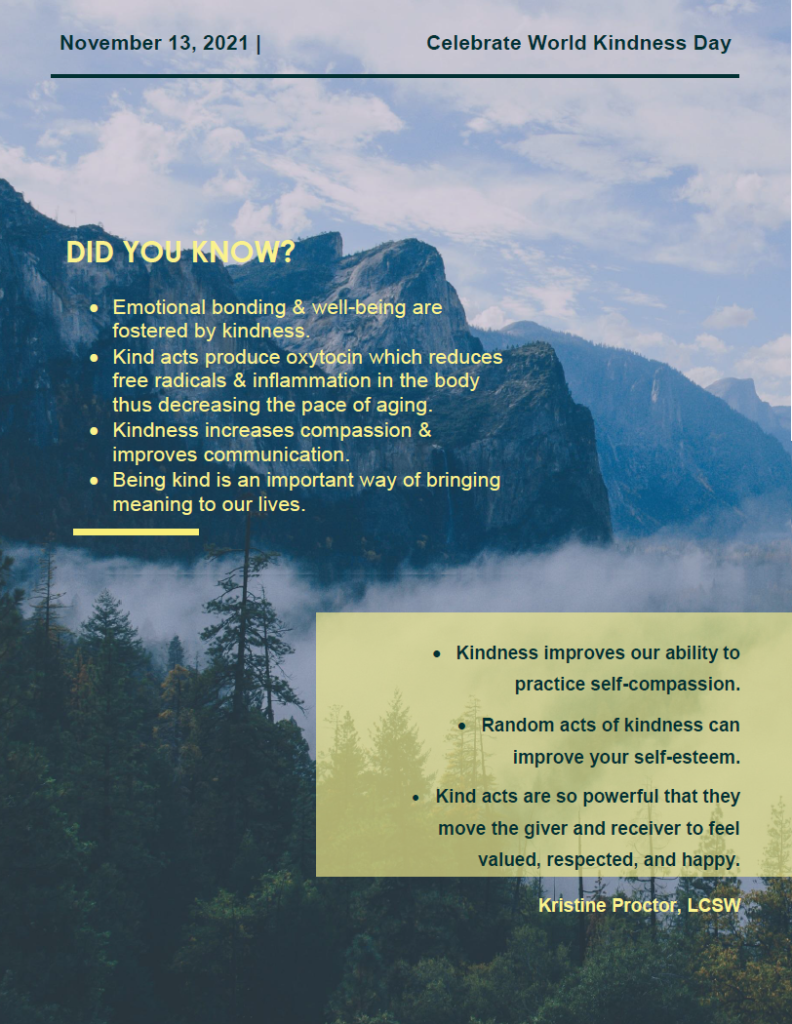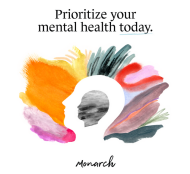Admin
Find Emotional Freedom: A Free Workshop
Find Emotional Freedom: A Free Workshop

Antidote for Negativity: Gratitude
Antidote for Negativity: Gratitude
Have you been feeling depressed, anxious, or angry a lot lately? Do you notice you’ve been experiencing tendencies toward worry and negativity that are affecting your focus, relationships, or even your sleep patterns?
Here’s an idea: Focus on what you’re thankful for.
I know. Stay with me. It sounds a little silly and counterintuitive but I’m not suggesting it brings instantaneous happiness or that gratitude is a cure all. However, it is a simple approach that anyone can implement. And if things are bad enough that you’re looking for alternative solutions, what do you have to lose?
It’s a scientifically proven fact that gratitude is a skill that can be cultivated with practice. To get started, try to identify your overall mood or feeling. Then review some simple things in the moment that you can identify as good. Finally, notice how gratitude makes you feel emotionally, mentally, and physically. That’s it.
 Even if it doesn’t feel natural yet, mentally thinking about it is helpful. Our minds love repetition! Finding a time to add gratitude practice into your routine will grow the habit and may increase the mental health benefits you experience over time.
Even if it doesn’t feel natural yet, mentally thinking about it is helpful. Our minds love repetition! Finding a time to add gratitude practice into your routine will grow the habit and may increase the mental health benefits you experience over time.
Research consistently shows that those who practice paying attention to what they are grateful for have fewer symptoms of illness, more optimism and happiness, stronger relationships, and more generous behavior. You can change your default tendencies and have great rewards from a simple practice. So do you have a little time to get grateful today?
Kristine Proctor is a licensed clinical social worker providing counseling, both in person and via telehealth, to individual adults in Florida, Michigan, Maine, and around the globe. To contact Kristine click here.
Four Reasons You Need Alone Time
Four Reasons You Need Alone Time!
What comes to mind when someone asks if you’ve taken some time off for yourself lately?
Maybe something like “I’m too busy for that!” or “Wouldn’t that be nice?” (asked with a laugh).
 Perhaps a reminder of the benefits to mental and physical health and to emotional wellbeing would shift your perception of time alone from a luxury to more of a necessity.
Perhaps a reminder of the benefits to mental and physical health and to emotional wellbeing would shift your perception of time alone from a luxury to more of a necessity.
Alone time helps you recharge. Regardless of our personality type, research shows that it takes the brain a greater amount of energy to socialize than it does to be in solitude. In order to balance being “on” a significant amount of time, intentionally having some time alone helps us to slow down and clear our minds. Increased creativity, focus, and productivity are also proven to result from alone time.
Taking time for yourself gives you freedom to reflect about your life and what’s important. Are what you do and who you spend time with aligned with your truest beliefs and goals? Time to contemplate can facilitate a reset in priorities and the time to plan how to make the changes that support it.

Spending time alone helps self-regulation, which is the ability to be aware of and effectively manage both positive and negative emotional states. “Me time” helps reduce depression and anxiety and provides opportunity for you to reconnect with yourself. This deeper knowing of yourself supports your ability to recognize when you have a need and to confidently care for yourself.
The bottom line?
Regular alone time is an effective way to reduce your stress and increase your life satisfaction. So, schedule yourself some solitude today!
Kristine Proctor is a licensed clinical social worker providing counseling, both in person and via telehealth, to individual adults in Florida, Michigan, Maine, and around the globe. To contact Kristine click here.
It’s Emotional Health Week!
It’s Emotional Health Week!
So how can you take small steps to develop this essential part of your wellbeing this week?
Here are a few ideas:
Take some time to check in with yourself. How are you feeling lately? What are some strategies that help to maintain and improve your emotional baseline?

Do one thing today that will improve your mood.
Eliminate one thing today that will free up some time, energy, and/or emotional space.
Talk about emotional health with those around you. Share about your desires and needs and support those important to you by asking about theirs.
 We can all develop our emotional health regardless of our age and circumstances. Regular focus on emotional health serves to enable not only us, but those around us, to thrive.
We can all develop our emotional health regardless of our age and circumstances. Regular focus on emotional health serves to enable not only us, but those around us, to thrive.
Mental health is health!
Kristine Proctor is a licensed clinical social worker providing counseling, both in person and via telehealth, to individual adults in Florida, Michigan, Maine, and around the globe. To contact Kristine click here.
Are the January Blues Real?
Are the January Blues Real?
A new year can feel hopeful, full of potential, and inspire us to refocus on the impact we want to make in our personal lives and community. It can also highlight challenges and obstacles.
You may be surprised to learn that January is the worst month of the year for depression and anxiety. Yes, the “January blues” are real.
The holidays tend to be a time where we have an abundance of expectations and needs. Post-holiday, we slow down and then have more opportunity to be aware of thoughts and feelings that have arisen over the past weeks.
Processing these can be hard and something we’d like to avoid.
Another contributor to mental health challenges in January is family dysfunction or unresolved childhood trauma, highlighted by the time of year or holidays.
So what can we do to function at our best?
Be Mindful. Pay attention to your moods. Track your thoughts and remember just because you have a thought doesn’t mean you believe it. Notice your expectations. Check in with yourself throughout the day.
Work to identify your feelings and then give yourself permission to acknowledge them. “I notice I am feeling lonely.” While it may seem that “just” acknowledging your emotions isn’t much, the reality is that ignoring them can lead to an increase in anxiety, depression, physical symptoms, and even panic attacks.
Do a feelings versus fact check. Recognize you can have strong, negative feelings AND you can be a good person/be okay. We can get absorbed by our strong emotions and the accompanying physical sensations to the point that our current experience seems like a full representation of what is real. This often leads to a disconnect from what’s true, or what we really believe about ourselves, our situation, and/or others.
Find ways to express and process your feelings such as journaling or a creative outlet;  exercising or yoga; do some focused tapping (the Emotional Freedom Technique/EFT).
exercising or yoga; do some focused tapping (the Emotional Freedom Technique/EFT).
Address your trauma. Trauma affects the brain’s ability to appropriately respond to situations, increasing hypervigilence. A trauma informed counselor can help guide you through resolving the trauma and moving forward toward healing.
Expect challenges rather than focusing on having everything be smooth and controlled. Then trust that you’ll be okay to handle whatever comes up.
Focus on what you can control right now. You may not be able to control the circumstance, but you can attempt to be intentional about your responses to thoughts and feelings.
Reach out for support. Mental health challenges, such as depression and anxiety, often lead us to withdraw. Research shows that social connection can provide a significant amount of support to help us cope and heal. Connect with people you trust and find a counselor to work with, if needed.
to withdraw. Research shows that social connection can provide a significant amount of support to help us cope and heal. Connect with people you trust and find a counselor to work with, if needed.
Kristine Proctor is a licensed clinical social worker providing counseling, both in person and via telehealth, to individual adults in Florida, Michigan, Maine, and around the globe. To contact Kristine click here.
Freeing Yourself from the Power of Anxiety
Freeing Yourself from the Power of Anxiety
Kierkegaard, a Danish theologian and philosopher, once said, “The most painful state of being is remembering the future.” That sounds like an accurate description of anxiety, doesn’t it?
The intensity of our thoughts, body sensations, and emotions often suck us into a story that runs away with us and spirals out of control. We are often pressing ahead into the future or resisting what’s already here, which often puts us out of sync emotionally with what is currently happening. For many of us, this leads to overwhelm and anxiety.
Many of us don’t realize, or forget, that stress is a flowing set of mental and physical experience. It is not permanent and does not define who we are.
What if you could be aware of your experience without getting caught in it?
One way to do this is to try meeting anxiety with curiosity. Ask yourself some questions like…
What is this experience of stress?
How does it feel in my body? Where do I feel it the most? And the least?
What causes it? What results from it?
Can I feel this AND be okay?
Another way to avoid being caught in the story of your current experience is to invite yourself to NOTICE your thoughts and feelings rather than JUDGE them. For example, compare these two statements: “I notice I have a feeling (or thought) of anxiety.” versus “I am anxious.”
In the first statement there is a separation of the anxiety from yourself, and it can be observed. A thought or feeling can be controlled. It can be internalized or rejected as untrue. You have choice.
In the second statement, there is the implication that the anxiety is part of who you are– “I AM anxious.” This identification makes it much more difficult to challenge or to recognize fully that you have a choice to change.
In summary, recognizing that your thoughts and feelings are not YOU is key to finding ways to help yourself handle the anxiety you feel in a healthy way. May your increased awareness bring you further understanding, self-compassion, and increased emotional freedom.
Reach out to Kristine Proctor at 386-473-1062 or send her a message now.
Find yourself, and be that.

Licensed Clinical Social Worker
EMDR Certified Therapist
112 W. New York Avenue, Suite 205
DeLand, FL 32720
What do you expect?
What do you expect?
An EXPECTATION is a belief that someone will or should achieve something, while an ASPIRATION is a hope or ambition of achieving a goal.
On the surface there doesn’t seem to be much difference between the two. In fact, the use of the words interchangeably would likely not be corrected by those we are in conversation with. Many of us go through life without consciously delineating between expectations and aspirations.
However, over the years, many I’ve worked with have experienced a profound freedom from the negative side of expectations – the ‘shoulds’ and ‘have tos’ – when they’ve been able to recognize they can want, dream and work toward a goal much more effectively with this subtle shift in awareness.
Ideally, we want to develop the ability to be in the simplicity of setting the direction for our lives and recognizing that multiple factors influence outcomes. This can be accomplished by setting expectations and or aspirations. However, as humans we often get caught up in the striving and miss out on contentment in the process. It’s much easier said than done but the skill can be developed to aspire rather than achieve and rest in the mindfulness of our goals.
Focusing on our aspirations makes us more flexible to respond to the changes that take place because we’re no longer locked into a preconception of how our lives should be.
Being consciously aware of the relationship of our expectations to our aspirations can lead to us approaching life with the clarity of our choices. And this can make a huge difference in how we are experiencing life in the present. A human gifted with the capacity to imagine a future has so many benefits! Whether it’s planning a tasty meal, looking forward to the results of a project, or anticipating an upcoming vacation, the emotional, mental, and physical gains are real.
Reach out to Kristine Proctor at 386-473-1062 or send her a message now.
Find yourself, and be that.

Licensed Clinical Social Worker
EMDR Certified Therapist
112 W. New York Avenue, Suite 205
DeLand, FL 32720
Tips for Managing Situational Anxiety
Tips for Managing Situational Anxiety
Being a human gifted with the capacity to imagine a future has so many benefits! Whether it’s planning a tasty meal, looking forward to the results of a project, or anticipating an upcoming vacation, the emotional, mental, and physical gains are real.
That being said, I have never met anyone who could honestly say that they have never experienced some level of situational anxiety. This is part of a continuum with nervousness on one end, worry in the middle and anxiety at the other end. Situational anxiety is the reactions we have – physical, cognitive and emotional – when faced with a scenario that is novel or has elements of unpredictability and the unknown.
Examples of situational anxiety triggers include things like starting a new job, meeting someone new, having to give a speech or presentation, flying, making phone calls or preparing for or experiencing a natural event, such as a tornado or hurricane.
Symptoms of situational anxiety are similar to those of generalized anxiety (see Counseling for Anxiety) and can include things such as apprehension or nervousness about an upcoming event. Worry that distraction cannot alleviate. Increased heart rate and breathing, blood pressure, pulse, and respirations, restlessness. The expression of helplessness or a hard time getting to or staying asleep because thoughts continue to spiral.
Some level of nervousness, worry or anxiety can potentially be beneficial. In the face of a new or novel experience, situational stress could potentially enable an increased focus and motivation to act.
So, how to respond to situational anxiety in order to decrease or eliminate it when it is happening? And how can situational anxiety be prevented?
Here are a few tips:
Get prepared. Focus on what can be controlled and on adequate readiness.
Remind yourself of past successes and that you can trust yourself to do the best you can in the situation.
Expose yourself to parts of the upcoming situation or to the scenario as a whole. This is a common approach to eliminating phobias and anxiety. Situational anxiety tends to decrease as familiarity increases.
Focus on self-care. Be consistent with your nutrition, sleep hygiene, personal connections and activities that help your recharge.
Practice relaxation techniques such as deep breathing, EFT (Emotional freedom techniques), otherwise known as tapping and positive visualization.
Notice your thoughts, feelings and body sensations. Identify what you notice and acknowledge it. “I notice I am having the thought ___.” Try to focus on the fact that you can have these thoughts/feelings/sensations AND not have to focus on finding a solution. Try to hold the tension between the intense feelings and the facts. This mindfulness will work to eliminate judgement, which often manifests as an inner critic spewing shoulds and shame, which are not productive (and likely not true).
When you experience the symptoms of anxiety in a particular scenario and self-help does not make the difference you need in order to function as you normally do, you may need to reach out to a licensed clinical social worker or mental health counselor. Cognitive behavioral therapy and EMDR (Eye movement desensitization and reprocessing) are two types of effective therapy for situational anxiety.
Dealing with anxiety is one of Kristine’s specializations. Reach out today for help to feel better tomorrow.
Reach out to Kristine Proctor at 386-473-1062 or send her a message now.
Find yourself, and be that.

Licensed Clinical Social Worker
EMDR Certified Therapist
112 W. New York Avenue, Suite 205
DeLand, FL 32720
Body Image, Self-Esteem and Self-Confidence
Body Image, Self-Esteem and Self Confidence
Our mental health is directly impacted by how we feel, think and act. It makes sense then, that body image and self-esteem can significantly affect our emotional well-being.
Body image is the mental picture we have of ourselves, along with the feelings we have when we look at our reflection. A person with a healthy body image accepts their body as it is and is not actively trying to change it.
Self-esteem is the image you have of yourself as a person. A healthy self-esteem reflects a perspective of respect and appreciation for who you are, as you are right now.
The truth is, we all struggle at times with our body image and self-esteem. We all need an accurate understanding of what impacts our thoughts and feelings about ourselves and our bodies, both negatively and positively, so that we can respond intentionally. And sometimes we need feedback and support from outside of ourselves to gauge the accuracy of our understanding and give ourselves the opportunity to develop a healthier perspective and habits.
If you’re feeling stuck and are looking for ideas about how you can improve your body image and self-esteem, support is available. Kristine Proctor is an experienced, licensed clinical social worker with a practice dedicated to helping people become the best they can be through various talk therapies and experiential therapies, including Eye Movement Desensitization and Reprocessing (EMDR) and the Emotional Freedom Technique.
Kristine can help you to identify the contributing factors to your feelings and thoughts about yourself and give you the support and tools to increase your self-esteem and self-confidence, have a more stable mood, improve your body image and lead to a general overall improvement in the quality of your life.
Reach out to Kristine Proctor at 386-473-1062 or send her a message now.
Find yourself, and be that.

Licensed Clinical Social Worker
EMDR Certified Therapist
112 W. New York Avenue, Suite 205
DeLand, FL 32720
Good Faith Estimates: What You Should Know
Good Faith Estimates: What You Should Know
As of January 1, 2022, there is a new law called the No Surprises Act that requires all health care providers to give clients who don’t have insurance or are not using insurance an estimate of the bill for medical items and services they are to receive because the provider is out-of-network for their benefits.
“Surprise billing” is when you receive a bill with an unexpected balance. This can happen when you cannot control who is involved in your care, such as when you have an emergency hospitalization and a service is provided by an out-of-network provider at an in-network facility.
You have the right to receive a Good Faith Estimate for the total expected cost of any non-emergency items or services. This includes related costs like medical tests, prescription drugs, equipment, and hospital fees. In the case of mental health, it refers to the number of sessions you are likely to have with your mental health professional (a licensed social worker, mental health counselor, marriage and family therapist or clinical psychologist).
Your health care provider should give you a Good Faith Estimate in writing at least 1 business day before your medical service or item. You can also ask your health care provider, and any other provider you choose, for a Good Faith Estimate before you schedule an item or service.
If you receive a bill that is at least $400 more than your Good Faith Estimate, you can dispute the bill.
Make sure you save a copy or picture of your Good Faith Estimate.
If you are a client of my practice, you will have been sent a Good Faith Estimate through the client portal. To view and acknowledge receipt of your Good Faith Estimate, log into your client portal. Your Good Faith Estimate was created based on our current meeting frequency and your session rate but may likely be overestimated, in order to provide you the maximum amount of out-of-pocket expenses for treatment. If additional services are recommended, your Good Faith Estimate will be revised to reflect the change. The estimated costs are good for 12 months after the date of the Good Faith Estimate.
Remember, this is not a bill. If you do not have as many sessions this year as are listed in the estimate, then your costs will be lower than estimated. The Good Faith Estimate includes additional information about your rights and how to learn more. And as always, feel free to reach out to me with any questions you may have.
For more information about your right to a Good Faith Estimate or how to use the dispute resolution process, you can visit www.cms.gov/nosurprises or call 1-800-985-3059.
** The No Surprises Law has already seen several revisions, so it is subject to change. This document on the CMS website currently has an expiration date of 3/31/22.
Find yourself, and be that.

Licensed Clinical Social Worker
EMDR Certified Therapist
112 W. New York Avenue, Suite 205
DeLand, FL 32720
Celebrate World Kindness Day
Kindness provides many benefits to one’s mental health.

Find yourself, and be that.

Licensed Clinical Social Worker
EMDR Certified Therapist
112 W. New York Avenue, Suite 205
DeLand, FL 32720
Holistic Mental Health Tools
Over the past year and a half plus, the Covid-19 pandemic has shifted our world in a myriad of ways. One of the most prevalent changes has been the realization that in order to live our best life, we all need to make taking care of our mental health a priority. Having so many aspects of our routines, expectations and even our core beliefs challenged has created a need for all of us to figure out how to continue to function with ongoing distress, how to focus on what we can control and how we can become more resilient, I had a chance recently to share about the holistic mental health counseling perspective and some tools we can add to our mental health toolboxes.
Find yourself, and be that.

Licensed Clinical Social Worker
EMDR Certified Therapist
112 W. New York Avenue, Suite 205
DeLand, FL 32720
Self-regulation and Mindfulness
As explored in our last blog, the ability to cope with the many challenges of life, whether big or small, and our emotional responses to them, has a relationship with something called self-regulation. Remember, self-regulation is the ability to manage one’s emotions, behavior and body movement when faced with difficult situations.
Below is a follow-up article by my colleague, Joel Bennett, M.Ed., which explores the potential for improving our self-regulation through several mindfulness-based interventions. Joel shares how you can add to your mental health toolbox and positively increase your capacity for self-regulation in several simple, easy to apply ways.
Find yourself, and be that!

Licensed Clinical Social Worker
EMDR Certified Therapist
112 W. New York Avenue, Suite 205
DeLand, FL 32720
Self-regulation and Mindfulness
By Joel A. Bennett, M.Ed.
 Often, through unwritten or unspoken norms, we perceive that our value and worth is tied with action and production. While it is better to think ahead, make previsions for the unknown, and get the laundry done, an often-overlooked aspect of self is quiet mindfulness.
Often, through unwritten or unspoken norms, we perceive that our value and worth is tied with action and production. While it is better to think ahead, make previsions for the unknown, and get the laundry done, an often-overlooked aspect of self is quiet mindfulness.
Is mindfulness the property of Eastern thought and religions? Not according to a study that looked at the correlation between different interventions and their impact on self-regulation (Pandey et al, 2018). Remember, self-regulation includes focusing and maintaining attention, regulating emotion and stress response among many other descriptors (Blair and Raver, 2015, Pandey et al, 2018). With constant action and minimal or unintentional awareness of what “is”, our ability to control our emotions and stress responses suffers.
What is mindfulness? Mindfulness can be defined as practicing awareness of what is, internally as well as externally (Pandey et al, 2018). Okay, but what framework would support me in learning to perform mindfulness activities? I will give three examples of what mindfulness activities may look like.
Mindful Breaths
When you control your breathing, you can control many parts of how you experience life. When you sit up straight, you allow your nerves and air way to work as they were designed. Breathe in through your nose slowly. Feel the air filling your lungs and then pushing down into your belly. Sit with your belly full for 4 seconds and then let the air escape slowly out of your mouth. We will call this 4-4-4 breathing. 4 counts in, 4 counts hold, and 4 counts exhale. Go ahead, pause and practice right now. (Sit straight, with feet flat on the floor, count out loud or in your head. Think: inhale, hold and exhale.) Build up your tolerance for how long you can sustain this purposeful breathing activity. Most individuals struggle doing this for more than a minute at first. The Navy Seals do a similar activity they call squared breathing. They count to 5 and they add the empty lungs to the end of the activity just described. Pick a time during the day and practice your mindful breathing. Prevention and habit have been shown to impact emotion and stress responses (Galla & Duckworth 2015).
Foghorn
 Another breath activity is called the Foghorn. This is an interesting option for those that are not self-conscious or are able to have a few minutes in a location no one is able to hear you. Sit up straight or stand and correct your posture, place your fingers on your neck just below your jaw, and feel the vibrations as you exhale through your mouth, supported by your diaphragm. Make a low rumble type noise like a foghorn. This works with your mouth open or closed. This activity engages the vagus nerve and helps to calm emotions.
Another breath activity is called the Foghorn. This is an interesting option for those that are not self-conscious or are able to have a few minutes in a location no one is able to hear you. Sit up straight or stand and correct your posture, place your fingers on your neck just below your jaw, and feel the vibrations as you exhale through your mouth, supported by your diaphragm. Make a low rumble type noise like a foghorn. This works with your mouth open or closed. This activity engages the vagus nerve and helps to calm emotions.
Planted Seed
 Make your spine straight again. In this activity you will choose an external quote or phrase that you believe to be true towards you. You might think of the words of a friend sharing their appreciation for your kindness and generosity. For someone with a spiritual frame of reference an example might be a Biblical promise such as Deuteronomy 31:6 which says, “Be strong and courageous, do not be afraid. The Lord your God will never leave you nor forsake you”. Now pick one of the words or words that attracts your attention, such as kind, generous, courageous, or never leave you and imagine it is a little seed. Imagine planting that little seed inside your heart. Do the mindful breaths and imagine it growing and growing inside of you. Sit with the seed. Imagine those words seeping into your bone marrow.
Make your spine straight again. In this activity you will choose an external quote or phrase that you believe to be true towards you. You might think of the words of a friend sharing their appreciation for your kindness and generosity. For someone with a spiritual frame of reference an example might be a Biblical promise such as Deuteronomy 31:6 which says, “Be strong and courageous, do not be afraid. The Lord your God will never leave you nor forsake you”. Now pick one of the words or words that attracts your attention, such as kind, generous, courageous, or never leave you and imagine it is a little seed. Imagine planting that little seed inside your heart. Do the mindful breaths and imagine it growing and growing inside of you. Sit with the seed. Imagine those words seeping into your bone marrow.
Remember, the phrase you choose must be something that you truly believe.
Build the Habit
There are myriad frameworks to practice mindfulness. Don’t allow the sheer volume of options overwhelm you. Choose one or two and begin to make it a daily habit. By so doing, you will improve your body’s ability to regulate emotions and stress responses.
Joel Bennett, M.Ed.
Blair, C., & Raver, C. C. (2015). School Readiness and Self-Regulation: A Developmental Psychobiological Approach. Annual Review of Psychology, 66, 711-731.
Galla, B. M., & Duckworth, A. L. (2015). More than resisting temptation: Beneficial habits mediate the relationship between self-control and positive life outcomes. Journal of Personality and Social Psychology. 109(3), 508-525. Doi:10.1037/pspp0000026
Pandey, A., Hale, D., Das, S., Goddings, A. L., Blakemore, S. J., & Viner, R. M., (2018). Effectiveness of Universal Self-regulation – Based Interventions in Children and Adolescents: A Systematic Review and Meta-analysis. JAMA Pediatrics, 172(6), 566-575. https://doi-org.wgu.idm.oclc.org/10.1001/jamadediatrics.2018.0232
